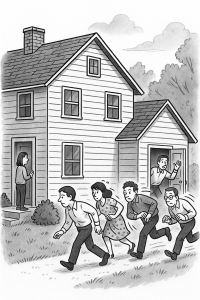Contrast with Past Simple

The past perfect can be tricky to explain, and even advanced students often default to the past simple. A clear way to highlight the difference is to compare:
- when I got to the party everyone left
- when I got to the party everyone had left
Write both sentences on the board and ask students to explain the difference in meaning. This helps them see how the past perfect is used to show that one action happened before another in the past.
Past Perfect Predicaments
A fun and imaginative way to practise past perfect sentences is by explaining how someone ended up in a strange or unexpected situation.
Instructions:
- Print or prepare a set of past perfect predicament cards.
- In pairs, students place the shuffled cards face down.
- The first student draws a card and reads it aloud to their partner.
“I saw you at a party last week. You had a big smile on your face.”
The second student must now explain why, using the past perfect:
“Yes, I had just got a promotion.”
“I was smiling because I had drunk a whole bottle of champagne.”
Tip:
Model the activity clearly first—students often try to explain what they were doing at the time, rather than what they had done before.
Wrap up by sharing a few of the most creative or grammatically strong responses with the class and reviewing any common errors.
Past perfect predicament printables
What Happened Before?
This is a flexible speaking or writing task that focuses on cause and effect in the past. It works especially well after introducing the structure with sentences like:
I was crying because I had forgotten her birthday.
She failed the test because she hadn’t studied.
Give students a set of sentence stems and ask them to complete them using the past perfect. You can either have them write out their ideas or just speak in pairs. Encourage follow-up questions where possible.
Sentence stems:
- I was crying because…
- I missed the bus because…
- He was angry because…
- We were late because…
- She didn’t eat dinner because…
- They didn’t enjoy the trip because…
- I was surprised because…
- He didn’t come to class because…
Example answers:
I missed the bus because I had woken up late.
She didn’t eat dinner because she had already eaten at work.
Extension:
Challenge students to create a short story linking two or three events:
“I missed my flight because I had lost my passport. I had put it in my other bag, which I had left at the café.”
Focus on the sequence of events and review the best examples at the end.
Third Conditional
The past perfect also forms the third conditional, used for unreal situations in the past:
“If I had studied harder, I would have passed the exam.”
You’ll find several engaging third conditional activities on the Conditionals Grammar Games page.
